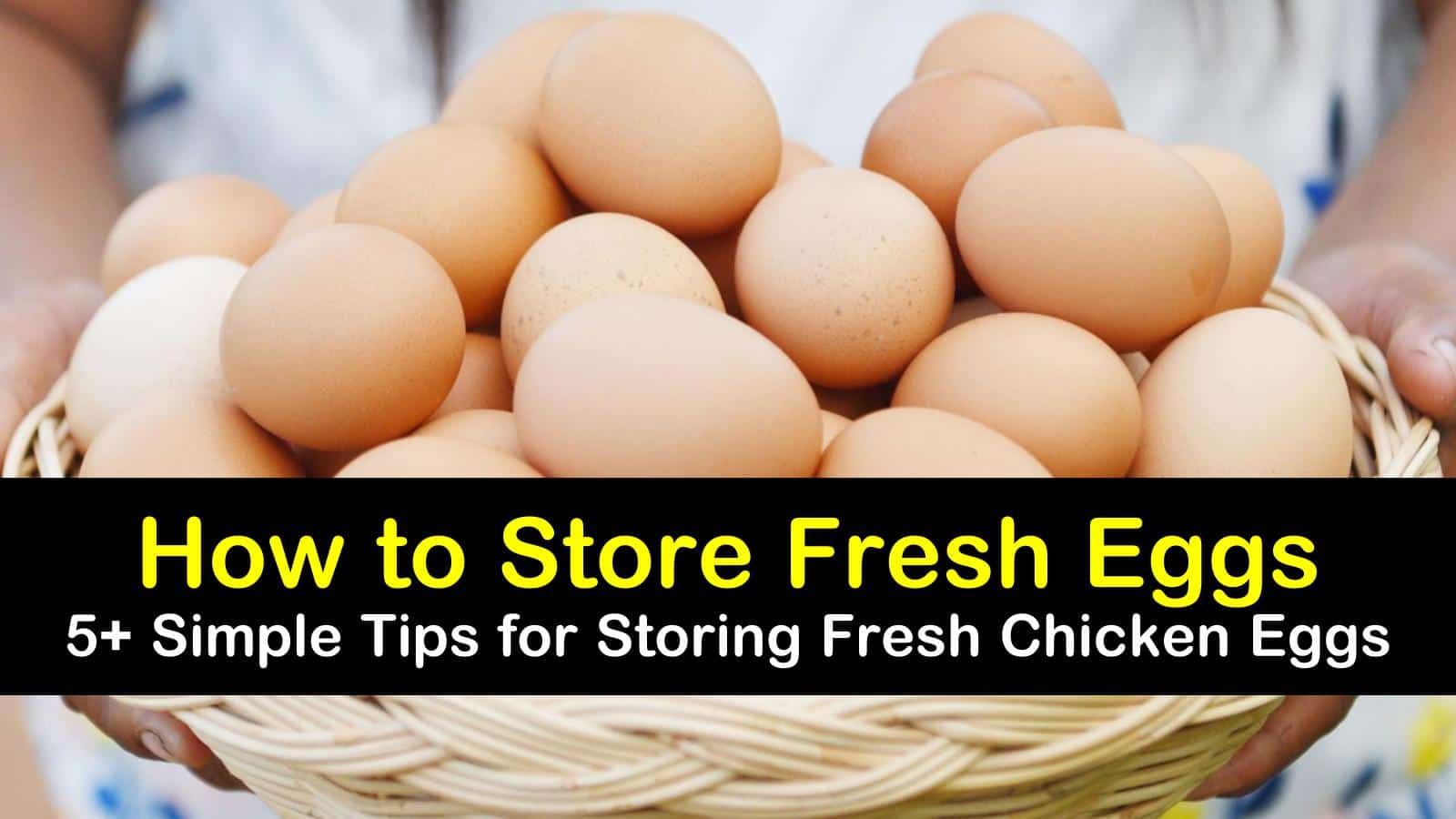Have you stumbled on a great deal on eggs at your local grocery store and have so many eggs that you don’t know what to do with them? Perhaps, you just started the hobby of having backyard chickens only to discover the nest boxes full of eggs. Whatever the situation is, you’re probably wondering how to store fresh eggs properly so that they stay fresh.
Raising chickens is a fun way to bring the family together, whether you want fresh eggs or baby chicks. Having your own chickens and a chicken coop fully equipped with a nesting box is a dream come true for anyone wanting to try their hand at homesteading.
The only thing left to do is wait for those chickens to lay eggs so that you can enjoy your first eggs. The next step in this process is to learn how to keep those eggs fresh using proper egg storage.

Storing Fresh Eggs
Storing fresh chicken eggs bought at your local grocery store is entirely different than storing eggs you’ve purchased from your local farmer or collected from your backyard chicken coop. Eggs shipped to the grocery store go through rigorous cleaning and transporting processes mandated by the FDA that alter their shelf life and need to be stored accordingly.
How long do fresh eggs last? Farm fresh eggs are generally not cleaned after gathering them from the nest, and you can be pretty confident they are very fresh when you bring them into your home.
We’ll show you how to store eggs from the store, how to store fresh farm eggs from your free range chickens, and the difference between the two. We’ll also show you a way to prolong those eggs that are nearing their expiration date.
How to Test if Eggs are Still Fresh
If you have ever cracked an egg open only to discover that the inside had a creepy appearance and the foul smell it emitted was enough to change your mind on making an omelet, then you’ve already had your fair share of spoiled eggs. Here’s how to avoid this encounter in the future.

Place a large pan or bowl of cool water on the countertop. Place the questionable eggs into the water and observe their behavior. If the egg rests near the bottom and lays on its side, then it is still good.
If the egg falls to the bottom, but with its pointy end up, then it is still edible but nearing its expiration date. If the egg floats, it is time to discard it.
Prepare Eggs for Storage
If you bought your eggs from the local grocery store, then there is nothing you’ll need to do to prepare them for storage. On the other hand, if you have fresh eggs, there are a few things you should know before storing them.
Egg Prepping
For freshly collected farm eggs, do a quick inspection to determine if any of them need cleaning. While the general rule for fresh eggs is to avoid cleaning them until right before you use them, there may come a time when you find an egg that is covered in, well, poop.
Unwashed eggs last longer because the bloom that keeps out bacteria is kept intact. To remove anything unpleasant from the eggshells, soak them in a large bowl of water to loosen the gunk.
Hold the dirty eggs under cold water and gently wipe them. Dry them and place the clean eggs in the refrigerator for storage. The rest of the eggs can be left out.
Storing Fresh Chicken Eggs on the Counter
Eggs fresh from the farm have a protective barrier on their shell called a bloom or cuticle. This barrier keeps bacteria from getting inside the egg. It is because of this that fresh eggs last longer than commercial eggs, which go through a vigorous cleaning process.
While eggs kept in the fridge will last seven times longer, they tend to lose their flavor and color. If you haven’t cleaned your fresh eggs, then they can safely be stored at room temperature for up to one month.
Room Temperature Egg Storage
You can store fresh eggs in several different fashions on the kitchen counter. If you eat eggs quite regularly and are not concerned with eggs getting old, place them in a bowl.
If you want to keep track of which eggs are older and which ones are newer, use an egg skelter. This handy kitchen gadget holds eggs with the newer ones at the top and the oldest eggs at the bottom of the dispenser.
Store Farm Fresh Eggs in the Refrigerator
You must always store commercial eggs in the refrigerator, while uncleaned, farm fresh eggs are optional for the fridge. If you cannot eat your fresh eggs fast enough, store them in the refrigerator for longer shelf life. Unwashed fresh eggs stored in this manner will last up to three months. The following shows you how to store farm fresh eggs.
Refrigerating Farm Fresh Eggs
You can use an egg skelter for storing fresh eggs in the refrigerator to remove any guesswork when it comes to which ones to use first. You can also store up to a dozen eggs in recycled egg cartons. Make sure that you store the cleaned and uncleaned eggs separately and mark the egg carton with their type and date.
Store Commercial Eggs
When trying to determine how long can you store fresh eggs that you purchase from the grocery store, there are a couple of things to consider. The egg carton usually has an expiration or sell-by date stamped on it. The USDA states that commercial eggs will last up to five weeks when refrigerated.
Refrigerating Store-Bought Eggs
Never leave commercial eggs that you bought at the store at room temperature. Eggs bought at the grocery store have already gone through a cleaning process that has stripped them of their cuticle, making them vulnerable to bacteria at room temperature.
They are also a lot older than any eggs you get at the farmers market. Keep the eggs in their egg carton in the refrigerator for up to five weeks after purchase. If you are unsure of their freshness, try the egg float test.
Can you freeze eggs? Of course, you can. You can freeze eggs after cooking or store them in the freezer after you separate the yolks from the whites.
How to Store Older Eggs
Storing fresh eggs at room temperature shortens the shelf life of chicken eggs, so if you’ve made the mistake of keeping them out of the refrigerator and you know the expiration date is drawing near, extend their life by cooking them in their shell.
How long do hard-boiled eggs last? Hard-boiled eggs last up to one week in the refrigerator, and peeling the shell off of egg whites is much easier to do on older eggs than on fresher ones.
Hard & Soft Boiled Eggs
If you are using room temperature eggs, fill a large pot with warm water, otherwise use cool water. Place it on the stove burner and turn it to high. Place the eggs into the water gently, making sure that you submerge the whole eggs in water.
Wait for the water to come to a full boil, and then remove it from the heat and cover it with a lid. Let the eggs sit for 11 minutes if you want hard-boiled eggs and seven minutes for softer egg yolks. Once the time is up, place the pot into the kitchen sink and flush cold water into the pan for several minutes to cool the eggs.
The best way for how to store hard boiled eggs is in the refrigerator for up to a week. Soft-boiled eggs should be eaten within a couple of days.
Another unusual but delicious way to store eggs is by pickling them. There are many recipes for pickled eggs on our site, as well as a delicious recipe for spicy pickled eggs. Try pickling and you may never eat a plain hard-boiled egg again!
There is a big difference between commercial eggs and freshly laid eggs and how they can be stored. Gathering fresh eggs for your morning breakfast is satisfying within itself. Knowing that you have saved them properly to extend their shelf life for future meals is even better.

Understanding how to store fresh eggs, whether they are commercial or farm fresh, mean the difference between a great omelet and an unpleasant surprise, so why not pass our fresh egg storage tips on to your family and friends on Pinterest and Facebook?